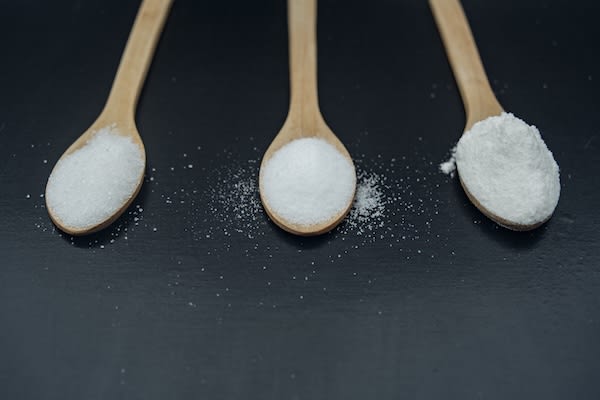Should you avoid the “three white poisons”?

[5 MIN READ]
In this article:
-
The “three white foods to avoid” refers to white sugar, white salt and white grains, which can increase your risk for heart disease and raise your blood sugar.
-
While it’s certainly important to limit these foods in your diet, there’s no need to eliminate them. Simply choose other, better alternatives most of the time.
-
Most of the sodium in your diet comes from processed foods. To avoid them and take a step toward improved health, try cooking more meals at home.
There are some people who believe that to maintain a healthy diet, you should avoid three white foods (sometimes called the “three white poisons): white sugar, white salt and white grains. In fact, there’s an eating pattern called the No White Food Diet that theorizes eliminating all white foods from your diet will help you lose weight and control your blood sugar.
There’s some truth to that sentiment, says Debrin Cohen, MS, RD, CNSC, a registered dietitian with Providence. But it’s not the whole story.
“Personally, I’m not a fan of cutting out specific foods unless it’s for health reasons, allergies or personal preferences,” she says. “This kind of diet can be too restrictive and might lead to an unhealthy relationship with food. Plus, some ‘white’ foods, like cauliflower and yogurt, have real nutritional benefits. I think it’s better to focus on the quality of the foods you’re eating rather than just their color, and make decisions based on what works best for you.”
That said, the biggest risk factors for diet-related health problems like diabetes and heart disease are, indeed, eating too much sodium (salt) and not eating enough whole grains and fruit. Many studies have also shown the negative effects of added sugar, and how a sugar-filled diet may lead to health problems like diabetes, cancer and heart disease.
Here’s a rundown of why too much of the “three whites” is not a good thing, and what you can do to make substitutes.
Too much sodium (salt)
Too much sodium can increase your risk of hypertension (high blood pressure), heart disease and kidney problems, says Cohen. It reduces your kidneys’ ability to do their job of removing excess water, and the extra fluid causes more strain on the blood vessels and leads to high blood pressure.
Most of the sodium in your diet actually comes from processed foods and restaurant meals — especially fast food. One of the best ways to reduce sodium is by cooking more meals at home. “This way, you can control how much salt goes into your food,” she says.
Cohen also suggests using herbs, spices, lemon and vinegar instead of salt to add great flavor, and checking food labels when grocery shopping to look for lower-sodium options. “Buying less processed snacks, canned soups, frozen meals and condiments can make a big difference,” she says.
If you find yourself scrambling for time to make healthy lunches and dinners, meal prepping can help you avoid frozen dinners and take-out.
The amount of sodium you should have every day depends on your age and any health conditions you have. In some cases, you may need to have extreme limits on the amount of sodium you consume. Be sure to talk to your doctor about the appropriate amount of sodium and the best foods for your diet.
Too much sugar
You may already know how sugar can increase your risk for obesity, weight gain and Type 2 diabetes. But did you know sugar intake can also increase fat in the bloodstream? Too much of this fat (known as triglycerides) can raise your risk for heart disease. “Plus, sugar can cause blood sugar levels to spike and crash,” says Cohen, “which can leave us feeling tired and craving more sugary foods.”
To cut back on refined sugar, Cohen recommends replacing sugary drinks like soda and juice with water and a splash of lemon or sparkling water. “When you’re shopping, it’s important to read ingredient labels for hidden sugars, like high-fructose corn syrup, dextrose or cane sugar,” she says. “You can also try using natural sweeteners like stevia, monk fruit or small amounts of coconut sugar or maple syrup.”
Too many refined grains
Refined grains, such as white bread, white pasta and white rice, have been stripped of their fiber, vitamins and minerals. Without fiber, they digest quickly, causing you to experience high levels of blood sugar, feel hungry and crave more food.
“I encourage you to embrace whole grains, like brown rice, quinoa and oats,” says Cohen. “You can also make simple swaps, like choosing 100% whole grain bread, pasta, tortillas and crackers, instead of the white flour versions. Also, when you’re buying packaged foods, it’s a good idea to check the labels and make sure that ‘whole grain’ is listed first in the ingredients.”
Not really “poisons”
So, the “three white poisons” aren’t so much poisons as foods that should only be consumed in small amounts. As noted above, in many cases, there are other options that taste just as good.
“Calling these foods ‘poisons’ is a bit extreme and oversimplifies things,” adds Cohen. “These foods can contribute to health issues when eaten in excess, but it’s really about balance. It’s more important to focus on your overall diet and lifestyle.”
Contributing caregivers

Debrin Cohen, MS, RD, CNSC, is a registered dietitian with Providence.
Find a doctor
If you are looking for a primary care provider or dietitian, you can find one who’s right for you in our provider directory. Through Providence Express Care Virtual, you can access a full range of health care services.
Download the Providence app
It’s all in the app: easily stay connected with Providence and your health. With the Providence app, you can schedule appointments, have virtual visits from the comfort of your home, get personalized health recommendations, access your health records and so much more. Learn more and download the app.
Related resources
6 tips to help your family eat healthy
This information is not intended as a substitute for professional medical care. Always follow your health care professional’s instructions.